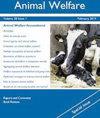养宠物是否与对待动物的价值观和态度有关?
IF 2.3
4区 农林科学
Q2 VETERINARY SCIENCES
引用次数: 1
摘要
在经济合作与发展组织(OECD)国家,宠物和宠物主人的数量近年来一直在增加。人们与宠物的经历可能会影响他们与动物的关系,尤其是对动物保护和使用的态度。然而,关于拥有宠物对动物价值观和态度的影响的研究相对较少。我们分析了养宠物与不同的价值观和对待动物的态度之间的联系。我们使用主成分分析从三个不同的数据集导出了对动物的七种态度结构。数据通过标准化的在线调查收集,调查对象为德国居民(数据集1 = 1,049名受访者;数据集2 = 414名受访者;数据集3 = 1,048名受访者)。这三个样本都是非概率配额样本。这七个态度构念代表了对动物的价值观和态度,从一般的价值观和态度(如动物保护)到更具体的态度(如吃动物)。我们使用方差分析分析了宠物拥有量、性别和年龄与这些构式的关系。我们的结果表明,效应大小是小到中等。养宠物与对待动物的更普遍的价值观和态度有着最强烈的联系,宠物主人更多地参与动物保护,更倾向于赋予动物基本权利。相比之下,我们发现更具体的态度,如对当前养猪系统的评估或对吃肉的态度,与性别的关系比与宠物的关系更大。我们的研究结果表明,养宠物与主人对动物的态度有关,但这种联系因态度的特殊性而异。本文章由计算机程序翻译,如有差异,请以英文原文为准。
Is pet ownership associated with values and attitudes towards animals?
In Organisation for Economic Co-operation and Development (OECD) countries, the number of pets and pet owners has been increasing in recent years. The experiences people have with pets might impact their relationships with animals in general and especially attitudes towards animal protection
and use. However, research on the impact of pet ownership on values and attitudes towards animals is relatively scarce. We analyse associations of pet ownership with different values and attitudes towards animals. We derived seven attitude constructs towards animals from three different datasets
using Principal Component Analyses. Data were collected using standardised online surveys with German residents (dataset 1 = 1,049 respondents; dataset 2 = 414 respondents; dataset 3 = 1,048 respondents). All three samples are non-probability quota samples. The seven attitudinal constructs
represent values and attitudes towards animals ranging from general values and attitudes towards, eg animal protection, to more specific attitudes towards, eg eating animals. We analysed the relationship of pet ownership, sex, and age with these constructs using ANOVA. Our results show that
effect sizes are small to medium. Pet ownership has the strongest association with more general values and attitudes towards animals, with pet owners being, eg more involved in animal protection and more in favour of awarding fundamental rights to animals. In contrast, we found that more specific
attitudes, such as the evaluation of current pig farming systems or attitudes towards eating meat, were more related to sex than pet ownership. Our findings indicate that having pets relates to their owners' attitudes towards animals, but that this association varies depending on the specificity
of attitudes.
求助全文
通过发布文献求助,成功后即可免费获取论文全文。
去求助
来源期刊

Animal Welfare
农林科学-动物学
CiteScore
2.30
自引率
8.30%
发文量
43
审稿时长
18-36 weeks
期刊介绍:
Animal Welfare is an international scientific and technical journal. It publishes the results of peer-reviewed scientific research, technical studies and reviews relating to the welfare of kept animals (eg on farms, in laboratories, zoos and as companions) and of those in the wild whose welfare is compromised by human activities. Papers on related ethical, social, and legal issues and interdisciplinary papers will also be considered for publication. Studies that are derivative or which replicate existing publications will only be considered if they are adequately justified.
Papers will only be considered if they bring new knowledge (for research papers), new perspectives (for reviews) or develop new techniques. Papers must have the potential to improve animal welfare, and the way in which they achieve this, or are likely to do so, must be clearly specified in the section on Animal welfare implications.
 求助内容:
求助内容: 应助结果提醒方式:
应助结果提醒方式:


